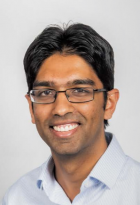PhD Top-Up Scholarships
- Are you an engineer, medical scientist, clinician, or industrial designer focused on health technology innovation?
- Want to access UNSW's world class facilities and staff?
- Apply now for a Tyree IHealthE PhD Top-Up Scholarship!
The Tyree IHealthE PhD Top-Up Scholarship offers enhanced opportunities for outstanding graduates undertaking a PhD aligned with the Tyree IHealthE mission. Engaging with us to complete your PhD gives your research the kick-start to translation. We offer you access to leading engineers, clinicians, end-users and mentors, facilitating your research through our innovative translation framework to develop real-world solutions.
The scholarship is $15,000 per annum for up to 3 years based on successfully completing yearly reviews. Scholarship recipients will also be able to access up to $5,000 over the life of the scholarship for professional development activities.
This opportunity has now closed. Read the scholarship recipient profiles.
Join a growing EMCR Community
Tyree IHealthE is establishing an EMCR Community; an informal group to bring together emerging researchers working, or with an interest, in biomedical engineering, connected health, and health technology research. The community is open to all UNSW researchers who identify as early or mid-career researchers (EMCR) including honours, masters, and doctoral research students. This is a great place to learn more about doing research in biomedical engineering and connecting with others. If you are interested in joining, please fill out the form below and if you have any questions please email Jacqueline Wells
Spotlight on Dr Praveen Indraratna | Tele Clinical Care, PhD student
As a trainee cardiologist, Dr Praveen Indraratna was struck by the profound impact he could have on patients, responding to life-threatening situations, and discharging them within just a matter of days. In 2017, he began looking for a PhD project that would allow him the opportunity to have a similarly immediate and tangible impact. He joined the TCC team, under the supervision of Associate Professor Sze-Yuan Ooi.
What have you learned from being part of this collaborative team? This is a model of care that could work across different specialisations, across different age groups, across hospitalised patients and outpatients - there is really limitless potential. Clinicians from every speciality should be looking at this and thinking about how they could collaborate with biomedical and software engineers to come up with solutions for their patients. It's great for us to see that what we, as clinicians, think of as an idea - purely an idea - can be made into a tangible product. It's really amazing what the technical team can do.
How has this experience impacted on you, professionally and personally? It's been very rewarding to be involved in something genuinely unique. A lot of doctors take a well-trodden path. Digital health is something brand new. It's something that enables you to help hundreds of patients in the time that you would otherwise help just one or two. It's had a great impact on me, being involved in a completely different model of care and a completely different way of treating patients than I would otherwise have had exposure to.
What do you hope the legacy of the TCC project will be? I hope that in 10 or 20 years’ time, every patient that comes through the hospital could be considered for some sort of digital health model of care, whether they've got diabetes, kidney disease, cancer, mental health conditions – whatever the cause may be. I hope that it's just a mainstream model of care, in the same way that drugs and surgery are standard models of care. I hope that in the future, people will look back and say, 'You know that cardiac trial? That was where it started, and now our whole hospital, our whole district, perhaps even our whole nation, is using a model of care based on that'.

